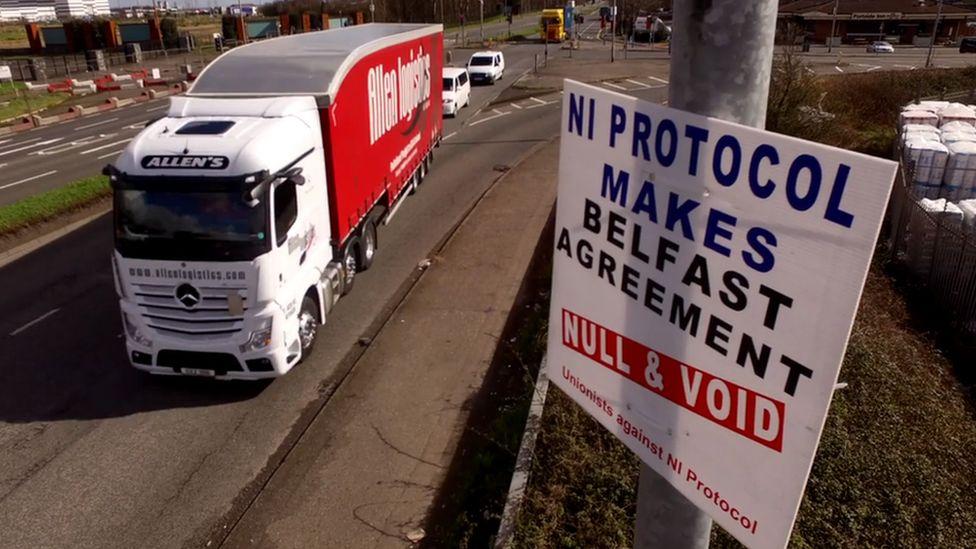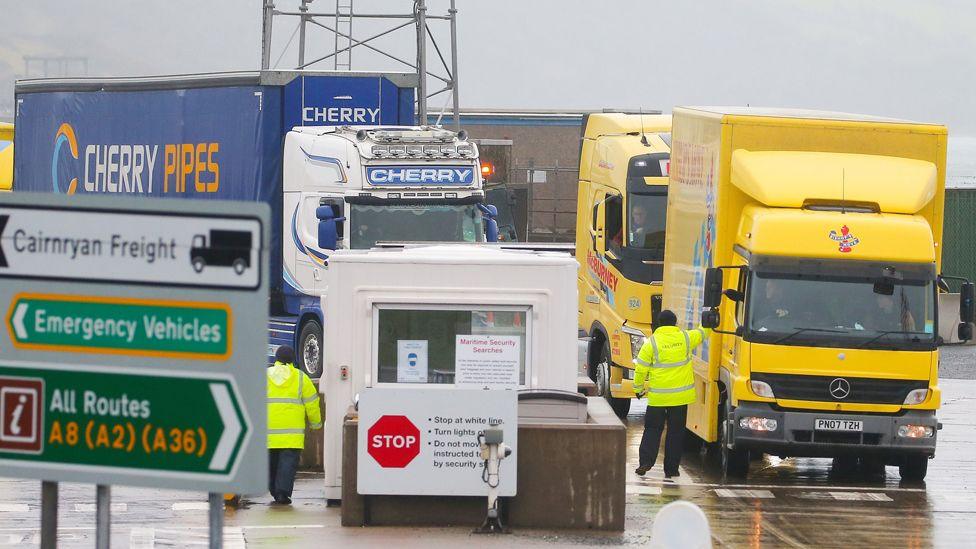Brexit: 'Proportionate' response needed for Northern Ireland Protocol talks
- Published

The Northern Ireland Protocol is the part of the Brexit deal that creates a trade border in the Irish Sea
Business leaders, trade unions and academics have urged the UK and the EU to deliver "balanced, bespoke and reasonable" solutions to tensions caused by the post-Brexit trade arrangements for Northern Ireland.
In an open letter, they call for a "proportionate and structured" approach to talks about the Irish Sea border.
The UK and the EU are at odds over the Northern Ireland Protocol.
The protocol keeps Northern Ireland in the EU's single market for goods.
It prevents a hard border with Ireland but some products need to be checked as they arrive from Great Britain.
Not all the checks have been implemented due to what are known as grace periods.
But decisions will have to be made soon with some grace periods set to end.
Those grace periods have delayed some of the checks which will come with the full implementation of the protocol.
The UK has not yet made a formal request for another extension.
As of 1 October, Great Britain-made meat products would be prohibited in Northern Ireland - a deadline that has become known as "the sausage ban".
The letter from businesses, unions and academics was published on Sunday, external, calls for discussions to deliver "mutually agreed solutions that resolve economic, political and societal tensions caused by Brexit and the Ireland/Northern Ireland Protocol".
These talks are said to be "critical to resolution and restoring commitments to the Good Friday Agreement and the totality of relationships embedded in North-South and East-West relations".
The group added that "support for the peace process cannot be rhetorical", and that "re-establishment of trust between the UK and EU is not only central to dialogue but imperative to the peace process".
Signatories include former Alliance leader Lord Alderdice, vice chair of Ulster University Paul Bartholomew and Northern Ireland Chamber of Commerce and Industry's Ann McGregor.
They call on the UK and EU to consider solutions put forward by business representatives, who are "critically aware of emerging tensions" caused by friction and barriers to the movement of goods.
They also add that many investors, business leaders, community groups and unions want to take the opportunities proffered by the protocol - but are unable to do so without "strategic leadership and proportionate decision making".

What is the protocol?
It is the deal agreed by the UK and EU to prevent a hard border between Northern Ireland and the Republic of Ireland after Brexit.
It does this by keeping Northern Ireland in the EU's single market for goods.
This means goods don't have to checked as they cross the Irish border, instead some checks and controls are required on goods entering Northern Ireland from the rest of the UK.
This has caused difficulties for some businesses and is opposed by unionist parties in Northern Ireland, which say it undermines Northern Ireland's constitutional position as part of the UK.
In July, the UK published a "command paper" proposing radical changes to the protocol but the EU says it will not renegotiate.
Related topics
- Published31 August 2021

- Published3 September 2021
